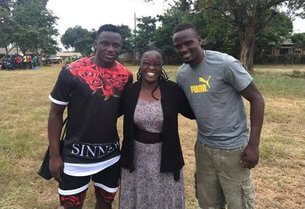In many respects, this is not a new story – churches have been using sport to engage in integral mission for centuries.
Yet football, one of the world’s most popular sports, has largely been absent from discussions about the UN 2030 Agenda for Sustainable Development with its 17 goals.
The Alliance, together with others, is seeking to re-dress this.
In March, senior Anglican clergy from East Africa, representatives from the English Premier League football club Crystal Palace and heads of NGOs using football to bring communities together and build peace met to kick off the “Football for Development” initiative launched in December with the Archbishop of Canterbury’s backing.
An elite player’s mother represented not just the professional footballer but also the hopes of many mothers and fathers who long to see their children flourish and follow their dreams.
Kick-off
The meeting began the process of identifying models of good practice the Church is using to combine faith, football and development.
The meeting aimed not only to get the ball rolling with the mapping exercise but also to begin exploring if the Church had a niche role within the wider conversation on sport for development and peace, said Anglican Alliance Co-Executive Director the Revd Andy Bowerman.
“With the largest-ever youth population in the history of the planet, the increasing inequity everywhere, the growing escalations in conflict and the promise to leave no one behind, there is a clear mandate for the Church to play its part.”
Deeper and closer partnerships – as called for by the Sustainable Development Goals (SDGs) – were urgently needed given the increasing scale of issues facing the global community, and the Alliance was ready to bring together Anglicans and Episcopalians with others to transform communities and end poverty in all its forms, he added.
The group hopes the Football for Development initiative can go beyond promoting the use of sports to enhance aid and development programmes to encouraging the global sports industry to back development efforts.
“For example, a serious consideration of sport, and football in particular, could allow for joined-up, innovative, creative and cost-effective approaches to engaging disenfranchised young people in some of the toughest contexts,” Andy commented.
He noted that football was already having an impact across the world sharing health messages, enhancing education initiatives and raising awareness of universal rights.
An initiative like Football for Development could help global football provide an alternative narrative to the corruption and greed of its current crisis – one of the “beautiful game” being used for human flourishing instead. But the working group agreed that a more focused approach was needed.
Next steps
The working group commissioned Andrew Deuchar of Football Clubs in Global Partnership to continue the mapping exercise, as well as to develop some pilot initiatives as models of good practice.
Andrew said he was looking at two possible projects: one with the Crystal Palace FC Foundation and Bishop Moses Nthukah of the Diocese of Mbeere of the Anglican Church of Kenya, and one with Football for Peace and Canon Désiré Mukanirwa, priest for Mission, Evangelism and Christian Formation ministry in the Province of the Anglican Church of the Congo, and Congo Brazzaville.
“There will be close collaboration, but [this] will allow the two organisations to work in their own style, and allow us the flexibility to look at how local context should shape our methodology,” Andrew commented.
Bishop Moses was delighted at the progress of the Football for Development initiative since its launch in December.
He said that the way that football and sport was allowing the churches to reach new parts of the diocese had been overwhelming.
“We have seen opportunities to bring groups together, to share key development goals and have conversations about how we might use our own resources to improve the lives of many in our towns and villages.”
With equal excitement, Canon Désiré shared how football is being used in his province to build economic stability and promote peace through messages stitched into the fabric of footballs made by community groups.
Canon Désiré invited others from around the Communion to share their story so that Andrew could build up as comprehensive a narrative as possible.
“[The churches] have to explore new ways of working and that includes connecting football with development and peace programmes,” said Désiré, a keen player himself.
The Football for Development initiative will build towards reporting to a key meeting on “sport for the social good” being hosted by Pope Francis at the Vatican in October.
“We aim to use the mapping to continue to describe the potential that the Communion has, and to make recommendations for sustainable development approaches and partnerships that combine what the Archbishop of Canterbury has described as the ‘universal languages of faith and football’”, Andy said.
––––––––––––––
Share your story
Is your church using football for development, empowerment or peace building? Send your stories to anglicanalliance@aco.org.
––––––––––––––––––––––––––––
*The UN General Assembly has named 6 April as the International Day of Sport for Development and Peace.
Photos, top to bottom of page: Anglican Alliance Africa Facilitator June Nderitu with professional footballers Victor Wanyama (Southampton FC, England and Kenyan International) and Macdonald Mariga (Parma, Italy and Kenyan International) in Mbeere, Kenya. Credit: Andy Bowerman/Anglican Alliance. Andy and Victor with a Global Goals football handstitched in Kenya by Alive and Kicking. Credit: Anglican Alliance.

